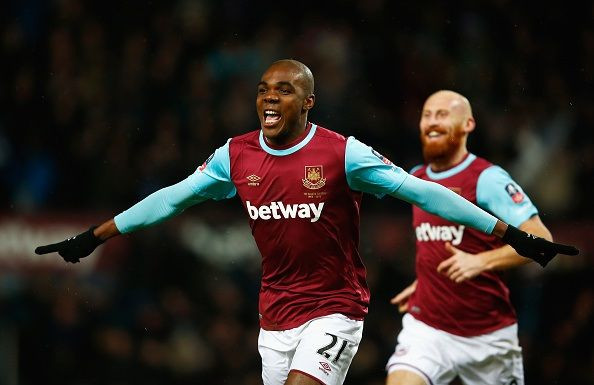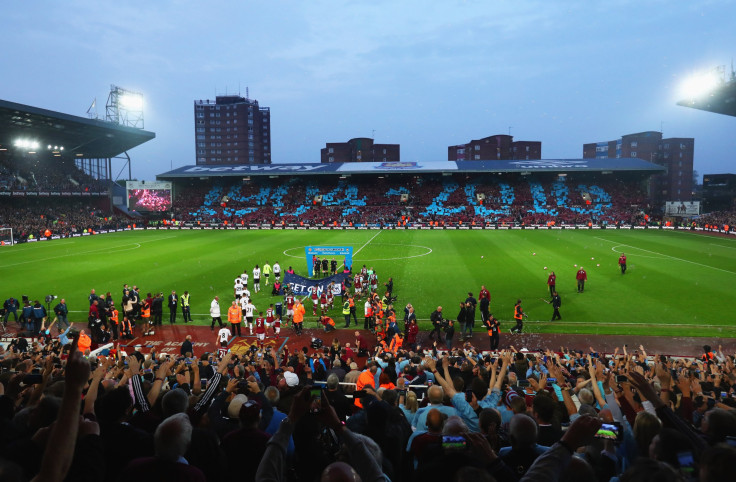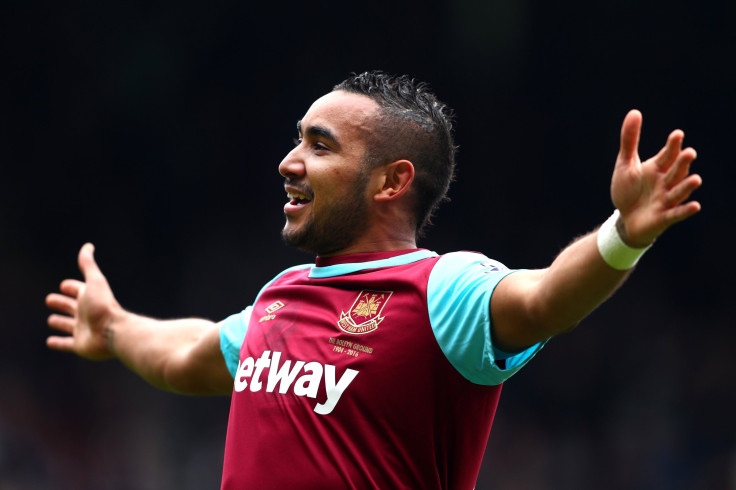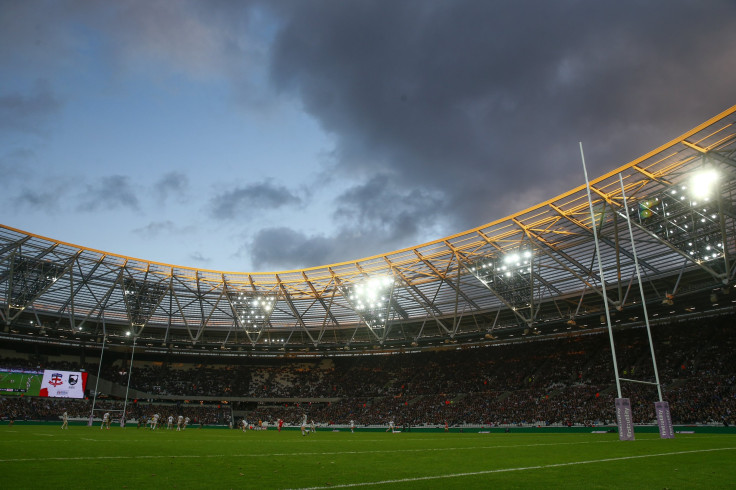West Ham United’s Olympic Stadium Deal May Lift London Football Club To Premier League Contenders In 2017

The extraordinary tale of Leicester City’s rise from 5,000-1 outsider to Premier League champion for the first time in its history has dominated not just English soccer, but the world of sports. But the prize awaiting another Premier League club is likely to be far more significant, long term. West Ham United, a team that has never finished higher than third in England’s top division in its 121-year history, will next season be handed the keys to London’s Olympic Stadium, all but free of charge.
The deal that handed the team one of the best stadiums in England largely at taxpayers’ expense has drawn plenty of criticism. Along with this week's events, it brought the colorful past of both the club and its owners back into the spotlight.
On Tuesday evening in East London, West Ham played its final match at modest Upton Park, also known as the Boleyn Ground, a stadium it has called home for 112 years. The night was a fitting symbol of the old West Ham — and what the club’s owners hope the new team will be.

Inside, the glamor of the world’s richest soccer league was in full evidence. Video tributes to Upton Park were paid from celebrity fans such as Keira Knightley, while legendary former players such as Bobby Moore, the man who captained England to its one World Cup win, in 1966, and Geoff Hurst, who scored a hat trick against West Germany in that final, were honored.
But outside the soon-to-be-demolished stadium, chaos reigned. Thousands of fans surrounded the bus of visiting team Manchester United, blocking its entry. Many threw beer bottles, shattering the windows, delaying kickoff of the landmark game by 45 minutes. It was an unpleasant reminder of an era of English soccer that most fans hoped had been left behind. That was particularly true for West Ham, which is embarking on what those in charge believe will be a glorious new era.
Players from @ManUtd filmed themselves as @whufc_official fans bombarded their coach with bottles and cans https://t.co/oDsgv02sqe
— Sky News (@SkyNews) May 11, 2016
A small group of fans appeared determined to relive the past. In the 1970s and ’80s, the nadir for soccer hooliganism in England, West Ham was one of the clubs most prominently associated with the “English disease.” In those days it wasn’t just a case of the odd fan who got carried away after some pre-match drinks. This was serious, organized business. West Ham fans, like those of other clubs, had their own hooligan group, the Inter City Firm, which became one of the country’s most infamous. The group even left calling cards on its victims that read “Congratulations, you have just met the ICF.”
Videos of the bottles barraging the Manchester United bus on Tuesday managed to capture the sign for “Green Street” in the background. To many across the world, that street is more well-known than the stadium it leads to. In 2005, the film “Green Street Hooligans,” starring Elijah Wood, depicted a West Ham hooligan firm’s battle with its notorious rivals from fellow London club Millwall.
That notoriety has been hard to shake off. Shortly after Ecuadorean forward Enner Valencia signed with West Ham two years ago he was asked why he joined the club. Sheepishly, and to the discomfort of the press officer sitting beside him, he admitted his only knowledge had come from “Green Street Hooligans.”
“I was not scared,” he said. “I respected the fact that they are very passionate, but when I found out I was coming here I didn’t know what to expect. But as soon as I arrived I was told that was all back in the day, in the old days, and it has all changed now.”
Ugly Anomaly
For the most part it has, with Tuesday night’s wreckage standing out as an ugly anomaly. The timing, though, was unfortunate. It wasn’t the image that club owners David Gold and David Sullivan seek as they attempt to present West Ham as a family club ideal for corporate entertainment at its new luxurious home. That disconnect may explain why Sullivan initially claimed that the Manchester United bus had not been damaged and instead blamed Man U, England’s most successful club, for the delay before kickoff.
The uproar blighted what had otherwise been a celebratory few days for West Ham. On the pitch Tuesday, West Ham came from behind to beat Manchester United and put themselves in contention for a place in the Europe’s secondary competition, the Europa League.
Still, under Croatian coach Slaven Bilić, and inspired by the brilliant Dimitri Payet, the team and its fans have had much to celebrate in the final season at Upton Park. In the past, a club that has been dubbed the “Academy of Football” has had far more success producing young talent than winning trophies. West Ham’s place in the financial pecking order meant that the top players it groomed went on to benefit the likes of Manchester United and Chelsea. Now, though, West Ham could reap the full benefits of that production line itself.

Next season the club will call the Olympic Stadium home, after the completion of an expensive, and controversial, conversion from the track-and-field arena that hosted the 2012 Summer Games. While all told the stadium has cost a staggering 701 million pounds ($1.1 billion), including 272 million pounds ($393 million) to turn it into a facility suitable for soccer, West Ham paid just 15 million pounds ($22 million), together with annual rent of 2.5 million pounds ($3.6 million). The public authority that runs the stadium, the London Legacy Development Corp. (LLDC), is also responsible for all of the overhead associated with running the stadium.
There are various other payments related to performance on the pitch and percentages of the sale of any stadium naming rights; it’s not surprising that it has been described as “the deal of the century,” and that Arsenal manager Arsene Wenger said West Ham had “won the lottery.”
Given that Arsenal had to work under financial constraints for several years while financing the 390 million pound ($565 million) cost of its Emirates Stadium, his resentment would be understandable. Even when Manchester City inherited the tax-payer funded stadium that was used for the 2002 Commonwealth Games, the club was made responsible for all the overhead and also pays 4 million pounds ($5.8 million) a year in rent. (And in that case there was no cost to the taxpayer of converting the stadium to a soccer facility because it had been built with the game in mind.)
“It is a once-in-a-lifetime opportunity,” Gold said. “Try to think of another opportunity. Manchester City — except they’ve planned it with skill and forethought, whereas we didn’t. We built a stadium that was built by a number of very arrogant people that had no foresight for the future. They built a ridiculous stadium, but we have made the best of it.”
The tentative plan was to convert the arena into a 25,000-seat track-and-field facility after the Olympics, as part of a commitment of the London bid to building a track-and-field legacy. Stefan Syzmanski, co-author of the book “Soccernomics” and co-director of the Michigan Center for Sport Management, said the lack of adequate planning was a result of the British government not actually expecting to win the right to host the games. Paris was the hot favorite at the time.
Still, just three months ahead of the Olympics in Rio de Janeiro, the stadium is yet another reminder of the cost of Olympic facilities, and the struggle to keep them from turning into white elephants.
“They’ve gone along with crazy promises, because they didn’t think it mattered,” Szymanski said of the Games’ organizers. “Many of us said throughout, ‘This is not going to end well,’ financially speaking. It was fine as far as an Olympic Games go. People liked the park, people will like the stadiums. There’s a lot of taxpayers’ money going down the drain here, but who’s counting?”
It was subsequently decided by the LLDC, headed by former London Mayor Boris Johnson, that making the stadium the home of a Premier League football club would be more financially viable. West Ham and fellow London club Tottenham put in competing bids. But Tottenham’s bid called for the removal of the running track, while West Ham’s did not — honoring the promise to promote track and field.
Geographical Importance
From a geographical point of view it also made sense. The Olympic Stadium in Stratford is only 2 1/2 miles away from Upton Park, meaning it is in the same area of London. Tottenham, by contrast, is located north of the city and more than 5 miles away.
However, West Ham is not the closest team in England to the Olympic Stadium. That distinction belongs to Leyton Orient, a team currently in the fourth tier of English soccer, attracting crowds of 5,000, and which has spent only one season in the top division. With West Ham offering cut-price season tickets and special deals for families and children, Leyton Orient, through then-chairman Barry Hearn, vehemently opposed West Ham’s move, arguing it would cut into a huge swath of Leyton Orient’s fan base.
Hearn had a point: The Football Association, which governs soccer in England, has a rule that states any team’s stadium can only be in a location that “would not adversely affect Clubs having their registered grounds in the immediate vicinity of the proposed location.” Leyton Orient wanted to explore the idea of a stadium share but that, too, was shut down.
“The bottom line is that West Ham had all the power,” Hearn said. “Imagine West Ham saying, ‘If you allow Leyton Orient to use the stadium, than we won’t bid.’ At that point, the government would have the embarrassment of having a 60,000-seat stadium with a typical crowd of 5,000 people and nothing else. So, that was never going to happen. Stadium sharing in England is really, really unpopular.”
Hearn has continued to criticize the agreement. “My dog could have negotiated a better deal for the taxpayer,” he said last month.
Meanwhile, West Ham reaps the benefits. The club announced this week that it has already sold out all of its 52,000 allocation for season tickets. That puts it second (in England) to Manchester United in season-ticket sales, and above the 45,000 at Arsenal’s almost identically sized 60,000-capacity Emirates Stadium.
The club stands to benefit from more than just additional regular supporters coming through the gates. The club has also sold out all of its VIP season tickets. With far greater hospitality facilities than at Upton Park, and located just minutes from London’s financial hub, Canary Wharf, the Olympic Stadium could easily become the destination of choice for corporate fans. Arsenal and Chelsea have dominated that market in recent years, but West Ham is now ready to challenge them on and off the pitch.
“West Ham will have a huge advantage by moving into a bigger and new state-of-the art stadium,” Szymanski said. “That will take them from being pretty much an average Premier League team to being the second or third-largest in terms of stadium capacity. The stadium’s revenue-generating potential is significant. New stadiums are more beneficial for selling goods and services to fans.
“West Ham’s old grounds had terrible transport links. The Olympic Stadium has phenomenal transport. You can get there from almost anywhere in London. I think they will become Premier League team contenders on a regular basis, assuming they manage things sensibly, of course.”

Gold and Sullivan have reason to be giddy with anticipation. Both men’s lives have been rags-to-riches stories. Gold grew up in a house on Green Street as the son of an infamous East End criminal known as “Goldy,” who spent five years in prison after falling asleep while on duty as a getaway driver.
Like his now business partner, Gold made his fortune in pornography, with the sex toy and lingerie empire Ann Summers, as well as adult magazines. Gold was tried, and acquitted, three times on charges relating to handling indecent material. Sullivan wasn’t so fortunate, serving 71 days in jail in 1982 for the charge of living off immoral earnings. The two men also share a lack of unease when discussing how they have earned their wealth.
“If I was selling guns or cigarettes, I might have doubts about what I’m doing,” Sullivan told Essex Life magazine in 2010. “But adults appear in these magazines and adults buy them, and I believe that as long as you don’t hurt anybody or commit a criminal act, adults should be able to do what they like with their lives. I can’t see a problem.”
Big Ambitions
In the latest Sunday Times Rich List, Sullivan’s fortune was listed as 1 billion pounds ($1.45 billion), with Gold’s, along with his daughter and business partner Jacqueline, at 300 million pounds ($444 million). Having sold their stake in Birmingham City in 2009, the duo purchased a controlling stake in West Ham, which valued the club at 105 million pounds ($152 million). The owners had big ambitions but the early results were far from positive. In its first full season in control, West Ham finished dead last in the Premier League and was relegated to the second-tier, which, according to Sullivan, cost the club 30 million pounds ($43.3 million).
West Ham immediately came back up to the big time, and stabilized over the next three seasons. Still, at the start of the season there were fears that the team could be relegated this campaign and find itself moving into the Olympic Stadium as a second-tier division club rather than a Premier League club.
Instead, West Ham is set for its highest league finish in 17 years. The excitement on the pitch has infected fans who have bought up next season’s tickets in droves. The timing could not be better. Gold and Sullivan will not only be counting the financial boon from the stadium move but from the introduction of a lucrative new broadcasting deal.
For the next three years, Premier League clubs will share 8.3 billion pounds ($12 billion), representing a 50 percent increase from the previous cycle. With England’s top division also sharing the revenue far more evenly than its European counterparts, even the team that finishes 20th and dead last next season will pocket 100 million pounds ($145 million), the same amount as Leicester City just earned for winning this year’s championship.
Before the broadcast deal was signed, Gold and Sullivan, at the end of 2014, valued the club at 400 million pounds ($578 million), four times what they paid for it. While they have insisted they are not looking to sell, others are not convinced.
“It's highly likely that it will be sold to foreign investors,” Professor Simon Chadwick from Coventry University Business School told BBC Sport last year. "If it's still in English ownership by 2020, I'll be very surprised.”
It’s not hard to see West Ham’s attraction for investors. After all, when Manchester City was sold to Sheikh Mansour bin Zayed Al Nahyan of Abu Dhabi’s ruling family in 2008, the previous owner, deposed former Thai Prime Minister Thaksin Shinawatra, said that having a stadium already in place was a major aid to getting a deal done.
West Ham could soon complete a dramatic transformation — from a club with a complicated past, owned by local boys who made good, to not just a national power but a foreign-owned global powerhouse.
© Copyright IBTimes 2025. All rights reserved.





















